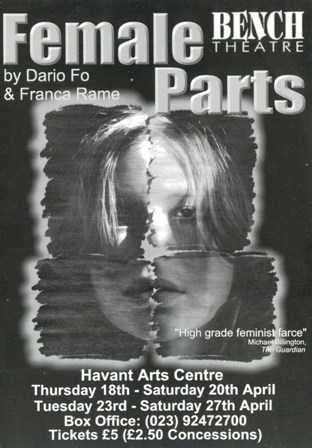The Bench Production

This play was staged at Havant Arts Centre, East Street Havant - Bench Theatre's home since 1977. While this was the first time Bench Theatre had staged all four monologues together, the company had previously produced Medea in 1993 as part of a series of solo performances called 'Let Me Finish!
Cast
| A Woman Alone | Angela Rubik |
| Medea | Sue Dawes |
| The Same Old Story | Robin Hall |
| Rise and Shine | Francine Huin-Wah |
Crew
| Director Medea Rise and Shine | Sam Emery |
| Director A Woman Alone Same Old Story | Damon Wakelin |
| Stage Manager | Jaspar Utley |
| Assistant Stage Manager | Becky Brigham |
| Lighting Design | Damon Wakelin |
| Lighting Operation | Stuart Monk |
| Sound Design | Darryl Wakelin |
| Sound Operation | Simon Walton |
| Props | Megan Utley |
| Leaflet Design | Pete Woodward |
| Set Design | Sam Emery Damon Wakelin |
| Publicity | Neil Pugmire Paul Millington |
| Photographs | Bill Whiting |
| Programme Editor | Derek Callam |
| Front of House | Sharman Callam |
Director's Notes
My pieces, ('Same Old Story' and 'A Woman Alone') are comedies! They have their serious intents and moments of great pathos and occasional power, but we must never lose sight of the fact that they are entertainments. A monologue is a huge challenge. Everything is reliant on one person in performance. All of the characters, places, creatures and voices within the pieces are born of the same source. No one else can help if it goes wrong; if your cue doesn't arrive, it is because you haven't given it to yourself. There is nowhere to hide!
How do you direct a woman in plays so single-mindedly female? I can help guide on technical and ephemeral things such as rhythm, pace, physicality and so on. As for the intention, the meaning of the words, the best I can do is ask questions of the actress' - they, by definition, must have a greater insight, empathy and connection with the text than I... beyond that it is my job to encourage them and to help them find confidence in themselves and the material... above all I must keep it interesting; for the performers and for the audience.
Damon Wakelin
This was all my idea. An idea that, within a couple of days of suggesting it, I was half-wishing had never made it out of my mouth. We only had 6 weeks, three-quarters of a cast and a sketch of a set design to turn into a show. I was even more apprehensive after reading the scripts for the first time. Not for their quality - they are, as many people had told me, tried and tested, award-winning pieces of writing. I passionately believe in the message each of them carries and love the gutsy, 'sock-it-to-em' style they use to get that message across.
It was this "pulls no punches" approach that worried me - some of the language, the images, the content, the 'feminism'- how would an audience react? I imagined a worse case scenario; surely they'd all leave at the first hint of the 'f'-word (both four letter and f-eminism)! I was wrong to worry. I should have had more faith in the material and our audience. As we began rehearsals the true nature and strength of the pieces started to show. They are very, very funny, acutely (sometimes painfully) observed and portray a picture of womanhood that is as relevant today as the day of their conception over 30 years ago.
If I had space I would wax lyrical about the hard work and commitment of Sue and Francine. Their pieces are very different but equally challenging and they've both developed performances that do themselves and the monologues proud. Enormous thanks also go to the backstage crew, the rest of the Bench for the many jobs they've done to get this show up and running, and especially to Damon, my co-director, whose energy, belief and dogged calm has seen us through. Doing 'Female Parts' has been fun and eye opening in so many ways I couldn't write them all down without filling another programme. Suffice to say I'm glad I said it out loud after all.
Sam Emery
Reviews
The NewsJames George
Quality is hit and miss
Bench Theatre tackles this feminist piece with gusto. The result is an entertaining - if somewhat patchy - evening's theatre-going, the four plays within the play being of varying quality.
Woman Alone is a Pythonesque view of a woman trapped in a humdrum life. Angela Rubick's delivery is machine gun although, on occasion, she seems uncertain of the words. With this type of piece, care must be taken to balance the reality of the speech with the unreality of the situation. It is here that the director and actress do not quite pull it off. Medea is the only one of the four plays with a much blacker edge. Sue Dawes manages the dual characterisation well, with words firmly in place.
Same Old Story is undoubtedly the highlight of the evening. Robin Hall's performance is truly hilarious and some of the best acting occurs in her tenure of the stage. Watch out, particularly, for the small, frightened moment in the clinic. Ridiculous in her indignity, terrified of the future. Nice. In Rise and Shine, Francine Huin-Wah shows her strength as an actress and tackles the manic comedy with skill. Until April 27th.
The News, 19th April 2002











